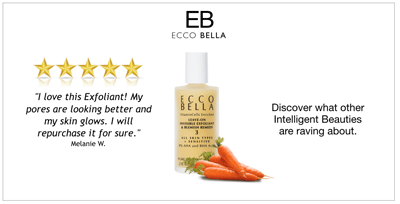Ingredient Meet & Greet: The Science Behind Beta Carotene
28th May 2018

The same component that gives carrots their rich orange color can do wonders for your skin. Beta carotene a precursor to vitamin A, makes your skin look younger, healthier, and more radiant. That’s why it’s one of the super nutraceuticals we include in our VitaminCells Skin Care products.
What is it?
Beta carotene is a member of the deeply pigmented carotenoid family. If you’re keeping track, other nutraceuticals in this group include lutein, lycopene, and astaxanthin. Beta carotene is responsible for that gorgeous orange and yellow color found in fruits and vegetables. Dietary sources include carrots (carotene is Latin for carrot, after all!), sweet potatoes, cantaloupe, winter squash, pumpkins, orange bell peppers, and apricots.
More than skin deep
When you apply a product like our Natural Age Antidote Day Skin Cream to your skin, the beta-carotene in it penetrates into your skin and boosts retinyl esters. Before we go further, let’s define that term and talk about why it’s good for you. Retinyl esters are the storage form of retinol, a derivative of vitamin A. Retinol can stimulate the production of new skin cells and help fade dark spots on your skin. In a 2004 study1, topical beta-carotene led to a 10-fold increase in epidermal retinyl esters.
Speaking of dark spots
Melasma is a common condition that causes skin discoloration, usually on the face, particularly on the areas that get a lot of sun such as the spine of your nose, forehead, chin, and cheeks. In a study2 of 31 adults clinically diagnosed with melasma, topically applied beta-carotene helped reduce or sufficiently eliminate the discoloration. Researchers tracked 26 patients who applied beta-carotene lotion daily for 8 weeks, and 9 who continued treatment an additional 16 weeks. In both groups, participants saw improvement, with more pronounced changes apparent with the longer treatment cycle.
Melanoma risk reduction study
A team of researchers3 studied nearly 70,000 individuals in Washington State to see if retinol supplements reduced the overall risk of melanoma. The study spanned over 5 and half years and illustrated a strong correlation between retinol intake via supplements and a reduced risk of melanoma in women.
Let’s talk more about UV protection
A team of researchers4 reviewed studies pertaining to the effects of carotenoids like beta-carotene and lycopene (another of our favorite nutraceuticals) in protecting your skin from sun damage. What they found was that people who had carotenoid-rich diets, or who regularly took supplements containing those vitamins, enjoyed photoprotection from UVA and UVB exposure. Another team5 evaluated seven studies published through 2007 and found that beta carotene supplements taken for a minimum of 10 weeks led to a reduced risk of sunburn.
Ready to tap into the benefits of this superstar nutraceutical? We have one more thing that will widen that gorgeous smile of yours even more. If you sign up for our EB Newsletter today, we'll give you $10 off. Don't stop there! Sign-up for our EB Rewards program to continue earning rewards.
So, go ahead: register, save, and splurge! Just make sure you snap a picture of your order when it comes in and share it with us on Instagram. We want to see what you got! Remember to tag @eccobellabeauty and use the hashtag #EBVitaminCells
1 Topical β‐carotene is converted to retinyl esters in human skin ex vivo. Christophe Antille, Christian Tran, Olivier Sorg, Jean‐Hilaire Saurat
2 Efficacy of beta-carotene topical application in melasma--an open clinical trial. Kar HK
3 Association of Vitamin A and Carotenoid Intake with Melanoma Risk in a Large Prospective Cohort. Maryam M. Asgari, MD MPH, Theodore M. Brasky, PhD, and Emily White, PhD
4 β-Carotene and other carotenoids in protection from sunlight. Stahl W, Sies H.
5 Protection from sunburn with beta-Carotene--a meta-analysis. Köpcke W, Krutmann J


